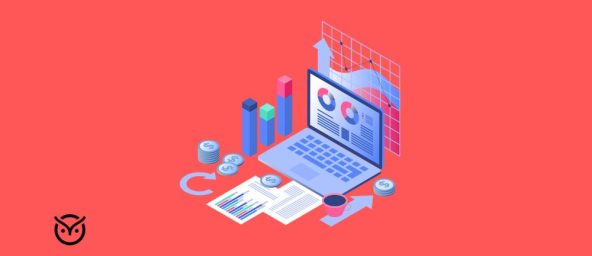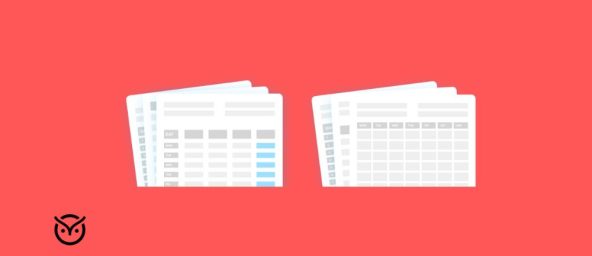
TL;DR
- 75% of HR pros see skills gaps despite strong resumes.
- Talent assessment tools give data-driven hiring insights.
- They test hard skills, soft skills, and culture fit.
- Benefits: better hires, faster hiring, less bias, skill growth.
- Choose tools for relevance, validity, user experience, and integration.
HR professionals say there’s a shortage of skills in candidates applying for jobs, even when resumes say otherwise. That’s where talent assessment tools step in. Without them, companies are left guessing. You risk hiring based on gut feel instead of proven skills. And that can cost you time, money, and morale.
The solution? Use the best talent assessment tools to cut through the noise and uncover real potential. These platforms don’t just test for skills. They also help with culture fit, decision-making, and long-term success. This blog will walk you through what works, why it matters, and how to choose the right fit.
What Are Talent Assessment Tools?
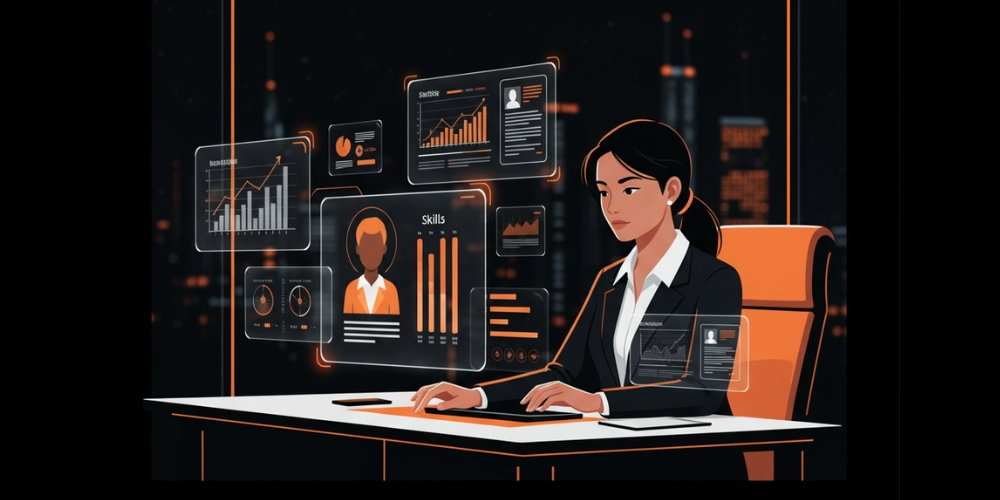
Talent assessment tools are digital platforms or software that help employers evaluate a candidate’s skills, personality, cognitive ability, and potential job performance before hiring. These tools go beyond resumes and interviews by providing structured, data-driven insights into whether someone fits a specific role.
At their core, talent management assessment tools support better hiring decisions and employee development by measuring competencies that matter most to performance. From technical skill assessment tools to behavioral and situational judgment tests, these solutions are built to answer one big question: What is talent assessment, and how can we do it better?
There are different types of assessment tools for recruitment and selection. Some focus on hard skills like coding, writing, or math. Others evaluate soft skills like communication, adaptability, and problem-solving. Many modern recruitment assessment tools combine both and use AI to predict long-term success in a role.
What Are Talent Assessment Tools?
Why Talent Assessment Matters for Modern Recruitment

Recruitment today is about finding people who can actually deliver in fast-changing roles. Resumes look impressive, interviews sound polished, but none of that proves skill or fit. That’s where talent assessment steps in. It replaces the guessing game with data. Instead of relying on intuition, you rely on measurable proof of ability, attitude, and potential.
Modern hiring demands precision. When you’re competing for talent across borders and industries, one wrong hire can cost months of productivity. Talent assessment tools give recruiters a reality check, showing who can think, solve, and adapt, not just who can talk their way through an interview. They help companies stay objective, reduce bias, and identify top performers before someone else does.
Why Talent Assessment Matters for Modern Recruitment
Benefits of Talent Assessment Tools

Want sharper hires with less guesswork? Here’s what’s in it for you:
1. Better Hiring Decisions
Aberdeen Group found that companies using pre-hire assessments are 36% more satisfied with their new hires. Why? Hiring assessment tools show you what a candidate can actually do before you hand them a desk, not after they’ve blown the first project.
2. Reduced Time-to-Hire
Automated testing and quick scoring systems help recruiters move faster through applicant pools. Many recruitment assessment tools now offer instant analytics and performance dashboards, helping you shortlist the right people within minutes.
3. Improved Quality of Hire
Skill assessment tools cut through the fluff. You’re not just hiring someone who talks a good game but who can actually play it. That means stronger performance and fewer quick exits.
4. Unbiased and Fair Evaluation
Structured tests level the playing field. Every candidate gets measured by the same yardstick, not someone’s gut feeling. If you care about DEI, employee assessment tools help you walk the talk with fair, consistent hiring.
5. Enhanced Talent Development
Not just for hiring, talent management assessment tools help HR teams spot skill gaps, upskill employees, and build succession plans with confidence.
In short, assessment tools for recruitment and selection don’t just streamline hiring. They support long-term business growth by making sure the right people are in the right roles.
Benefits of Talent Assessment Tools
Assumes 25% faster cycle time and 10% lower cost with structured assessments.
Types of Talent Assessment Tools
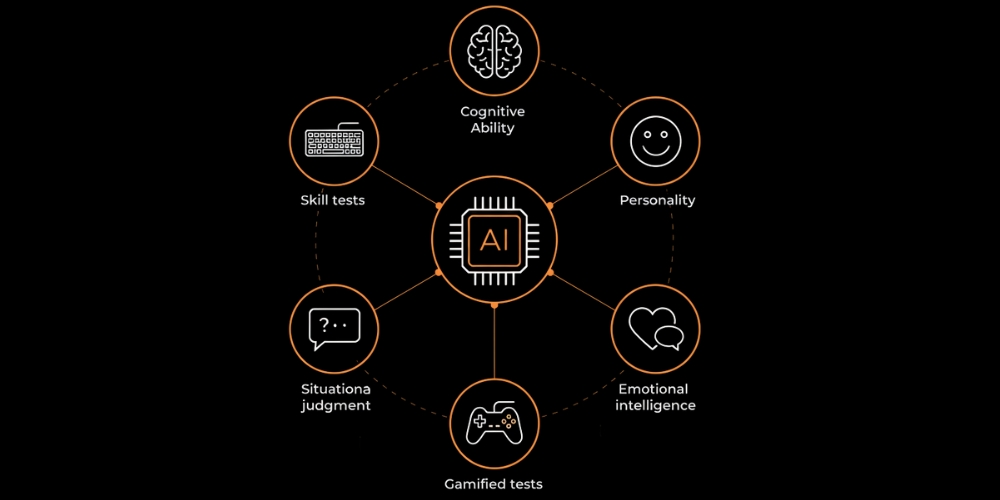
Not all assessments measure the same thing. Some focus on what candidates know, while others test how they think, behave, or adapt under pressure. Here are the main types of talent assessment tools recruiters use to build stronger, data-backed hiring decisions.
Skill-Based Assessment Tools
These tools measure a candidate’s hard skills, such as technical, functional, or role-specific. For example, coding platforms test programming ability, while writing or design tools gauge creative output. They reveal what someone can actually do, not just what they claim on paper.
Cognitive Ability Tests
Cognitive or aptitude tests measure problem-solving, logical reasoning, and learning speed. They help identify candidates who can handle complexity, think critically, and make sound decisions in new situations.
Personality and Behavioral Assessments
These tools go beyond skills to uncover how a person works, whether they’re a team player, a risk-taker, or detail-oriented. Behavioral insights help predict cultural fit and long-term success.
Situational Judgment Tests (SJTs)
SJTs place candidates in hypothetical work scenarios and ask how they’d respond. This shows their judgment, priorities, and emotional intelligence. These are the qualities that matter just as much as technical skill.
Emotional Intelligence (EI) Assessments
Emotional intelligence tools assess empathy, communication, and self-awareness. Roles in leadership, customer service, or team management often rely on high EI to maintain healthy workplace dynamics.
Game-Based Assessments
Modern hiring loves gamification. Game-based tools use fun, interactive challenges to measure traits like decision-making, focus, and adaptability, all while keeping candidates engaged.
AI-Powered Predictive Tools
These platforms use machine learning to analyze behavioral data and forecast future job performance. They combine multiple assessment types to predict not just who can do the job, but who will excel in it.
Together, these assessment types give recruiters a 360 view of every candidate's skills, mindset, and potential, making hiring decisions smarter and fairer.
Best Talent Assessment Tools Recruiters Should Try

With hundreds of tools available, choosing the right one depends on your hiring goals, company size, and the kind of talent you’re after. Below are some of the most trusted talent assessment tools used by top HR teams worldwide. Each offers a unique approach to evaluating skills, personality, and potential—helping recruiters make confident, data-driven hiring decisions
Vettio
Vettio is the ultimate AI recruitment tool, catering to both recruiters and job seekers to help them reach their respective goals. Whether a recruiter is looking for AI prescreening tools or a job seeker is looking for job preparation tips. Vettio does it all, and more.
Best for: Companies and job seekers that want to benefit from state-of-the-art AI technologies to find the best candidates and job opportunities, respectively.
Criteria Corp
Criteria Corp focuses on cognitive ability, personality, and skill testing. Its flagship platform, HireSelect, helps employers predict job performance using scientifically validated assessments. It measures aptitude, integrity, and emotional intelligence in one place. The platform’s clean reports make complex data easy to understand, ideal for fast-paced recruitment teams.
Best for: Companies looking for well-rounded insights combining logic, personality, and reliability metrics.
Hogan Assessments
Hogan is one of the pioneers in personality and behavioral testing. It helps recruiters understand how candidates will perform, lead, and interact under real workplace conditions. Its assessments focus on potential, derailers, and values, offering a complete view of what drives a person and where they might struggle.
Best for: Leadership hiring, executive roles, and culture-fit evaluations.
Pymetrics
Pymetrics uses neuroscience-based games and AI to assess emotional and cognitive traits. Instead of traditional tests, it measures behavior through interactive tasks that evaluate memory, attention, risk tolerance, and fairness. Recruiters love it because it makes hiring feel more human while staying data-driven.
Best for: Entry-level to mid-level roles and companies focused on DEI and candidate experience.
TestGorilla
TestGorilla offers more than 300 pre-employment tests across skills, personality, and cognitive areas. It includes anti-cheating features, async video responses, and customizable test setups. With quick setup and strong analytics, it’s become a go-to platform for growing teams that want hiring accuracy without extra admin work.
Best for: Fast-growing startups and SMBs that need reliable, scalable pre-hire assessments.
ThriveMap
ThriveMap specializes in realistic job previews that simulate what a candidate’s day-to-day would actually look like. These assessments improve candidate self-selection and reduce early attrition. By showing what the job really entails, recruiters save time and hire people who are truly ready for the challenge.
Best for: Operational and customer service roles where role clarity and expectations are critical.
McQuaig
McQuaig offers a suite of assessments that measure personality, cognitive ability, and motivation. It’s designed to help companies match candidates to roles and culture, offering clear insights into how someone will perform and grow within the organization.
Best for: Mid-sized companies focused on retention and long-term employee development.
Predictive Index
The Predictive Index focuses on understanding workplace behavior and motivation. It uses behavioral and cognitive assessments to align talent with company goals and roles. Recruiters use it to identify leadership potential and improve team dynamics through data-backed insights.
Best for: Strategic workforce planning, leadership hiring, and performance management.
Harver
Harver is built for high-volume recruitment. It blends behavioral, cognitive, and situational judgment tests into one streamlined experience. The platform automates scoring, integrates with most ATS systems, and provides fair, bias-free evaluations.
Best for: Enterprise companies and large-scale hiring operations that need consistency and speed.
Each of these tools brings a different strength to the table. Whether you’re hiring developers, sales reps, or future leaders, the right platform helps you see past the resume and focus on real potential.
What Is the Criteria for Choosing Talent Assessment Tools?
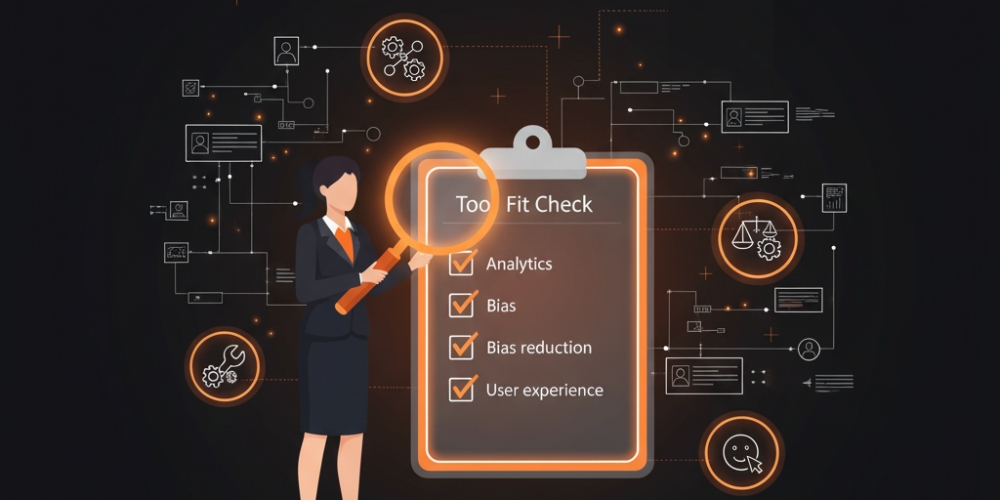
Not all talent assessment tools are built the same. Pick the wrong one and you’ll waste time, money, and maybe even lose top talent. Whether you're sizing up hiring assessment tools for developers or employee assessment tools for internal moves, the checklist stays pretty consistent. Here’s what to look for:
1. Assessment Relevance
The tool should match the role and look good in a demo. Hiring engineers? Use skill assessment tools with real coding tasks. Looking for sales or leadership talent? Go with tools that test communication, problem-solving, and decision-making under pressure. The right role, the right test, smarter hires.
2. Validity and Reliability
A good tool should be scientifically validated. This ensures the test results actually measure what they claim to measure. Reliable talent management assessment tools consistently deliver accurate results across candidates and settings.
3. User Experience
Candidates will bounce if your tool feels like a pop quiz from 2002. Pick recruitment assessment tools that look clean, work on mobile, and don’t need a manual.
4. Customization
If you use cookie-cutter tests, don’t be surprised when you get cookie-cutter candidates. The best talent assessment tools let you tailor everything from question formats to difficulty levels to custom prompts. That way, your assessments mirror the real job and the way your team actually thinks.
5. Bias Reduction
One of the biggest wins with assessment tools is cutting down on bias. Go for platforms that anonymize candidate data, use consistent scoring systems, and actively support diversity and inclusion. Fairer process, better hires.
6. Integration Capabilities
The best talent assessment tools don’t live in a silo. They sync effortlessly with your ATS, HRIS, and onboarding software so your team spends less time copying data and more time hiring smarter.
7. Reporting and Analytics
A basic tool gives you scores. A smart one tells you the story behind them. Choose platforms that offer deep analytics like benchmarks, skill gaps, and role-specific insights so you can make hiring decisions based on data, not intuition.
Optimize Lateral Hiring with Vettio Talent Assessments
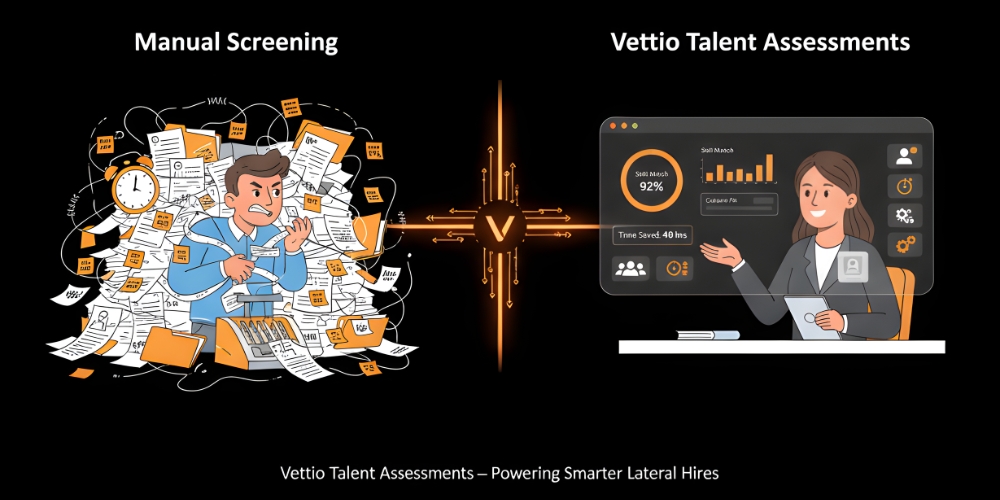
Lateral hiring isn’t about finding someone who can do the job. It’s about finding someone who already did it and can do it better, faster and with less hand-holding. That’s the tricky part. Most recruiters end up relying on fancy resumes and gut instincts that don’t say much about actual performance. The result is costly mismatches that waste time and lower team morale.
That’s where you optimize hiring with Vettio talent assessments. Vettio helps recruiters see beyond paper credentials. Its AI-powered platform evaluates experience depth, adaptability, and culture alignment, the hidden factors that make lateral hires succeed or fail. Instead of guessing who might fit, you get real-time data on who will truly thrive.
Each Vettio assessment blends skill testing, behavioral insights, and predictive analytics to create a complete talent profile. Recruiters can compare candidates side by side, not by buzzwords but by measurable potential. It’s like giving your hiring process X-ray vision, spotting skill gaps, leadership readiness, and even burnout risks before the contract is signed.
The best part is that Vettio doesn’t just streamline hiring; it sharpens workforce planning. You don’t start from zero each time. The system learns what success looks like in your company and keeps improving matches for future roles. With Vettio, lateral hiring stops being a guessing game and becomes a repeatable formula for smart and bias-free hiring decisions.
Conclusion
Talent assessment tools aren't a bonus in a world where resumes leave out the good stuff and bad hires burn budgets. They’re a must. The right platform helps you look past smooth talkers and spot real skills fast. Whether you need skill assessment tools, employee assessment tools, or full-stack talent management assessment tools, the goal is to save time, cut bias, and make stronger hires. Focus on what fits your hiring needs, make sure the tests actually match the role, and think long-term.
FAQs
Talent assessments bring data into the hiring process. Instead of relying only on interviews or résumés, recruiters use structured tests that measure real skills and behavior. This lowers bias and improves accuracy because every candidate is judged on evidence, not intuition.
Yes. Many tools like TestGorilla and iMocha are built for startups and small teams. They’re affordable, cloud-based, and easy to set up without technical help. These platforms help small businesses compete with larger firms by hiring based on skill, not scale.
AI platforms such as Vettio connect directly with leading assessment APIs. Results from coding tests, behavioral quizzes, or video interviews flow automatically into the candidate profile. Recruiters then see one dashboard combining AI-driven shortlisting with validated assessment data which makes decisions faster and smarter.


